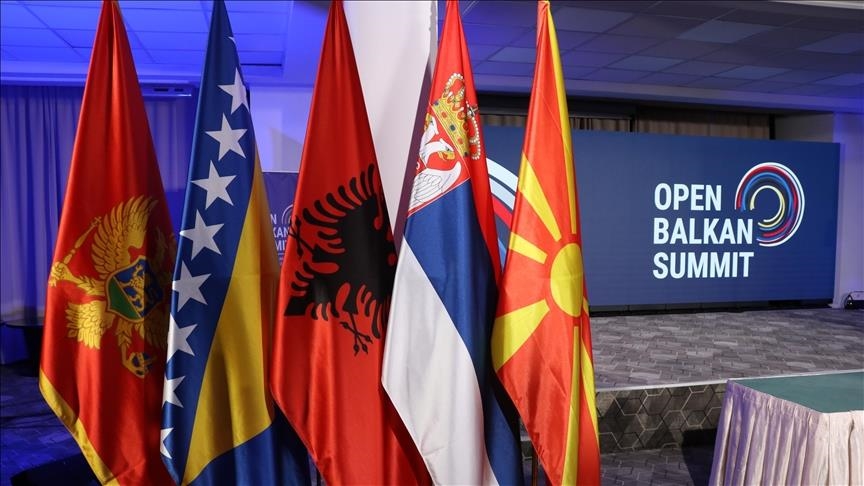ANALYSIS - How Open Balkan may turn out to be a bad idea
Instead of Open Balkan, European leaders should press for the start of EU accession talks with Albania and North Macedonia, awarding candidate status to Bosnia and Herzegovina and the visa-liberalization and candidate status to Kosovo
 File Photo
File Photo
The author is an associate professor at the Faculty of Political Science at the University of Sarajevo
ISTANBUL
In late July 2021, the leaders of Serbia, Albania, and North Macedonia met in Skopje to inaugurate a new initiative for the region called “Open Balkan.” The objective is to foster regional cooperation in this part of Europe and to create a common market that allows for free movement of capital, products, services, and labor. [1]
As part of the initiative, the three states signed five new agreements in December of last year. [2] The founding leaders of the Open Balkan see this regional cooperation as a complement, not an alternative, to EU integration. [3] Yet, three other Balkan states -- Bosnia and Herzegovina, Kosovo, and Montenegro -- have hesitated to join this project. The main reason is that there are concerns about the true intent of Open Balkan.
Why some are skeptical about the initiative?
While some analysts hailed the initiative as beneficial for the region, other experts like Jasmin Mujanovic pointed to why skepticism about Open Balkan persists: Serbia's ruling elite's ambitions in the region. Bosnia and Herzegovina, Kosovo, and Montenegro are worried that Open Balkan is a facade for Serbia's regional hegemony. The idea of a "Serbian world" -- most fiercely advocated by Serbia's Interior Minister Aleksandar Vulin -- looms large in any discussion of Open Balkan. Many see this Serbian world as a reincarnation of the Greater Serbia of the 1990s, which brought bloodshed and are worried about Serbia's real objectives in the region. [4] While President Aleksandar Vucic does not promote the idea, he has not publicly rejected it so far either.
Russia’s role in the region
Significant eyebrow-raising support for the Open Balkan came from Russia's Foreign Minister Sergey Lavrov. After three Balkan countries closed their airspace, which prevented his visit to Belgrade, Lavrov stated at a press conference in Moscow: "They probably did not want us to express support for Belgrade's initiative to realize the Open Balkan project in the interests of making healthier, stronger relations between all the countries of the region."
The foreign minister also criticized the EU and NATO for trying to "turn the Balkans into their project called Closed Balkans." Many in the region took Lavrov's backing for an open Balkan as a sign that the initiative's opponents were right from the very beginning.
Of the three states that have not joined, Kosovo is most openly opposed to Prime Minister Albin Kurti declining an invitation to join the recent Ohrid summit. Montenegro's new prime minister, Dritan Abazovic, has indicated that his country may also join Open Balkan. Meanwhile, the Democratic Party of Socialists remains opposed to this move.
No regional initiative should be alternative to EU
While regional cooperation should, in principle, benefit everyone, earlier regional initiatives have failed to deliver significant outcomes. With so much opposition to Open Balkan, it's unclear whether yet another initiative will be effective at all. There is a widespread realization in the region now that full EU membership remains a distant goal. The reasons for this are many and varied, but the optimism about the EU that was prevalent a decade ago is no longer there. Even commitments from key European leaders are taken with a grain of salt.
German Chancellor Olaf Scholz, for example, completed a two-day trip to the Balkans and promised to revive the European perspective of the region. Suppose the chancellor follows through on his promise and his government pushes for EU membership in the region. In that case, this could jump-start the moribund process of European integration of the Balkans. This would be far more beneficial for the region than support for regional initiatives.
Rather than supporting regional initiatives like Open Balkan, key European leaders should push for: i. The start of EU accession talks with Albania and North Macedonia; ii. The granting of candidate status for Bosnia and Herzegovina; iii. Visa-liberalization and candidate status for Kosovo.
No regional initiative should be an alternative to EU membership. If full membership remains off the table, Balkan states should work to develop and improve their bilateral relations with key global powers. This particularly applies to building strong ties with the US and working to ensure a strong American commitment to the Balkans.
For Bosnia and Kosovo, joining NATO is a primary objective, and NATO membership remains the most important strategic objective regardless of the state of the European integration process. Bosnia paid the highest price for the independence of all the Yugoslav successor states, followed by Kosovo. It is no coincidence that these two countries are hesitant to join Open Balkan, and their hard-won independence should not be jeopardized by joining initiatives with dubious political objectives.
[1]https://foreignpolicy.com/2021/08/25/balkans-dont-believe-eu-anymore-albania-macedonia-rama-vucic/
[2]https://balkaninsight.com/2021/12/21/leaders-sign-new-open-balkan-agreements-in-albania/
*Opinions expressed in this article are the author’s own and do not necessarily reflect the editorial policy of Anadolu Agency.








